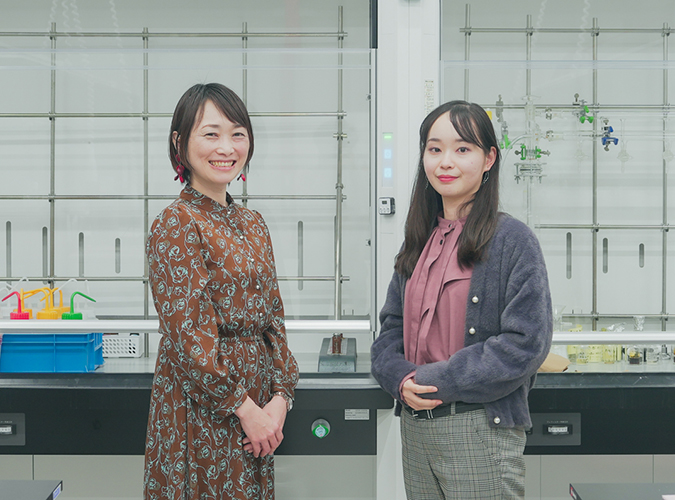150周年記念企画
「未来を拓く青学マインド」
やりたいことを追い求めて、
前に進み続ける
|校友・卒業生|
株式会社朝日新聞出版
国府田 直子
×
法学部
ヒューマンライツ学科
高垣 奏野
×
総合文化政策学部
総合文化政策学科
山辺 寧々
今年、創立150周年を迎えた青山学院。数多くの卒業生が、在学中の学びと出会いを礎に、さまざまな分野で自分のキャリアを切り拓いています。今回は、新卒で就職した業界から、夢をあきらめずに出版業界へと転向し、編集者としての道を歩んでいる国府田直子さんにお話を伺います。『青山学院大学新聞』の制作に取り組む「新聞編集委員会」の高垣奏野さんと山辺寧々さんが、情報を伝える仕事における心得や、青学での学び、夢を実現するための心の持ち方について、国府田さんにインタビューします。
Profile
株式会社朝日新聞出版
国府田 直子
1999年 文学部 日本文学科 卒業


AERAデジタル本部メディアプロデュース部次長。『大学ランキング』編集長(兼)AERA dot.副編集長。
青山学院大学卒業後、保険会社に就職。しかし、出版の仕事が諦めきれずに退職し、株式会社朝日新聞社での編集アシスタントのアルバイトを経験。その後、出版社勤務や、フリーランスのエディター・ライターを経て、2013年より株式会社朝日新聞出版に所属。現在は主に教育関連の媒体に携わっている。大学在学中はスキーサークル「シルニースキー愛好会」で活動。

法学部 ヒューマンライツ学科 3年
新聞編集委員会 所属
高垣 奏野
東京都立北園高等学校出身
自分の書いた文章や撮影した写真で、人の心や社会に影響を与えられる仕事に就きたいと考え、将来を模索中。塾講師のアルバイト経験から、教育分野にも関心を持っている。趣味で小説の執筆にも取り組んでおり、他者の考え方を理解し、幅広い視点で物事を捉えられるようになるため、法律だけでなく科学史など多くの知識を身に付けようと勉学にも打ち込んでいる。

総合文化政策学部 総合文化政策学科 3年
新聞編集委員会 委員長
山辺 寧々
東京都立両国高等学校出身
将来は、人に生きる力を与え、心の健康を支える仕事に携わりたいと考え、舞台などのエンターテインメント制作や、文章を通じて情報を伝える仕事を目指している。現在、「新聞編集委員会」の活動に全力で取り組むとともに、KUSHELL, Michael先生のゼミナール(ゼミ)や「音楽と心理」「アートセラピー論」「国際文化交流論」などの授業を通じて、相手に何かを広く伝えるために必要な知識や事例を学んでいる。
TALK THEME
1st TALK
「編集者としての
モチベーションは?」
「自分が書いた記事や作った本が誰かの役に立ち、
社会が少しでも良い方向に変わるきっかけになればと思っています」


山辺さん
私たちは、青山学院大学に関するニュースや団体・個人の活躍を報じる『青山学院大学新聞』を発行する「新聞編集委員会」で活動しています。将来は、書くことで何かを伝える仕事に就きたいと考えています。国府田さんは、就職活動の際、どのような理由で出版社を志望されたのですか?
日本文学科に進学した理由の一つは、高校時代に夏目漱石の『こころ』や武者小路実篤の『友情』といった日本文学に深く感動したことがきっかけで、出版業界を目指す原点となりました。卒業後は、文芸担当の編集者になりたいと思い、また、当時は雑誌もたくさん読んでいたので、雑誌編集者としても活躍できる総合出版社で働きたいと思っていました。しかし、現在に至るまでには回り道もあって、大学卒業後すぐに出版業界に入って働き続けてきたわけではありません。

国府田さん

高垣さん
そうなのですか?詳しくお聞きしたいです。
今思えば、総合出版社の編集者になりたいという志望動機が漠然とし過ぎていたのでしょうね。懸命に就職活動をしましたが、残念ながら希望の出版社には採用してもらえませんでした。そこで、まず安定した職に就き、オフタイムに、文芸に関するZINE*の制作など、自分の好きなことに集中しようと考えを切り替えました。そして保険会社の採用試験を受けて就職することができました。
初めての社会人経験は、業務も楽しく人にも恵まれ、仕事や職場環境が人生に与える影響の大きさを実感しました。だからこそ、「自分が最も興味をもてること、好きなことを仕事にしたい」という強い思いが湧き上がってきました。入社1年半で保険会社を退職し、再び編集者を目指して就職活動をやり直しました。
*個人や小規模のグループが自由な手法、テーマで制作する冊子

国府田さん

高垣さん
転職して編集者になったのですね。
アルバイトからフリーランス、そして正社員と、立場や働き方を変えながらキャリアを積んでいきました。新しい職場で経験を積むたびに、新たな目標を見つけ、次のステップへと進んできたのです。
その中でも、大きな転機となったのは、最初の転職活動がうまくいかずに始めた朝日新聞社での編集アシスタントのアルバイトでした。記者の方々が取材を重ね、情報を発信していく姿を目の当たりにし、その情報が時には社会を動かしたり変えたりする力になることに大きな魅力を感じました。それまでこだわっていた文芸から、興味の対象が「情報誌」に切り替わるきっかけになりました。
26歳のときに希望が叶い、情報誌を扱う出版社に入社できました。すでに新卒入社の方からは4年遠回りしていて焦る気持ちもありました。しかしその後、フリーランスの編集者・ライターになった際には、アルバイト時代のつながりで、朝日新聞出版が発行する週刊誌『AERA』のお仕事を紹介していただくなど、朝日新聞社の皆さんとの出会いが、私の「出版業界で働く夢」を後押ししてくださいました。このご縁と経験は、今の私につながる、かけがえのないものとなっています。
もう一つ、人生のターニングポイントになった経験があります。音楽家の小林武史さん率いる会社で約6年間働いたことです。そこで小林さんとMr.Children の櫻井和寿さん、そして故坂本龍一さんが2003年に設立した一般社団法人APバンク(ap bank)に深く関わりました。ap bankは、音楽の収益を活用して持続可能な社会をテーマに、さまざまなプロジェクトを立ち上げて活動しています。私はその理念や活動内容を言葉にして広く伝える仕事を担当していました。東日本大震災が発生し、社会全体でエネルギー政策や地球環境への価値観が大きく変わった時期でした。ap bankでの活動を通じて、「みんながより良く生きていける社会づくりに貢献したい」という強い思いが芽生えました。そして、これからは「社会に発信する情報」に軸足を置いていこうと決意し、今に至ります。
現在、編集長を務めている『大学ランキング』は、日本の大学を総合的に評価する情報誌です。教育は社会と密接に関わっており、教育を考えることは社会の未来を考えることです。教育に関する本の制作を通して、社会を多角的に捉え、コミットしてくことがいまの私自身のテーマです。

国府田さん

山辺さん
働きやすくて安定した場所から一歩を踏み出すのは、とても勇気が要ることだと思います。後悔せずに新しい環境に進むための秘訣はあるのでしょうか?
「つらい」とか「できない」といったネガティブな気持ちで辞めることはしないと決めていました。新しいことを始めるとき、最初の壁が高いのは当然です。その壁を乗り越えて、「ここでこういうことが学べた」と言えるものを身に付けられなければ、次にどこへ行っても同じだと思ったからです。「もう一歩、違うことにチャレンジしたい」という気持ちになれるまで、しっかりやり切ることが大事ですね。

国府田さん

山辺さん
私は、自分が書いた原稿を何度も読み返して修正を重ねる作業が、孤独でつらく感じることがあります。国府田さんは仕事のどんなところに喜びやモチベーションを感じられていますか?
書店で売られている本の奥付に、自分の名前が載っているのを初めて見たときの感動は、今でも忘れられません。それが私にとって最初の一歩です。今では自分が書いた記事や制作した本が、誰かの役に立ち、社会が少しでも良い方向に変わるきっかけになれば、と思っています。身近なところでは、朝日新聞出版から出版された本を参考に大学を受験し、その後、進学先で充実した大学生活を送ることができたという後輩の編集者がいます。彼女は「自分の人生に影響を与えてくれた出版社で働きたい」と、入社してくれたのです。それを聞いたときは本当にうれしくて、編集部のみんなで大喜びしましたね。

国府田さん

高垣さん
「新聞編集委員会」の活動を通して、本学の部活やサークルについてよく知っているつもりになっていても、実際に取材をすると、まだまだ新しい発見があり、驚かされることが多いです。そんな発見が、私にとって楽しいと感じる瞬間です。
発見の喜びは、取材の醍醐味ですよね。取材を充実させるために、事前にしっかりと調べることを徹底していますが、原稿の完成形をあらかじめイメージして取材に臨むと、面白みが半減してしまいます。原稿には、取材を通して初めて知り得た情報が入っていることに価値があると思っているので、取材では相手の言葉をよく聞き、考え、より深い言葉を聞き出せるようキャッチボールすることを心がけています。アンテナを張り巡らせて新しい情報を得られたときは、その先にいる読者に向けて「やったよ!」という気持ちになります。

国府田さん
2nd TALK
「今に生きる大学での学びは?」
「多角的な視点で考えてみる。
これはインタビューでも原稿を書くにしても大切にしてきたことです」

大学生活についてもお聞きかせください。文学部日本文学科での学びが、今の仕事にどのように生きていると感じますか?

山辺さん

国府田さん
文学に目覚めた高校時代、手に取った青学の大学案内に「文学を読むということは、その時代を読むということであり、客観的に人の人生を知るということは、その後の自分の人生に必ず役立つ」ということが書かれていたのを、今でも覚えています。この言葉に共感し、どんな仕事に就いても助けになるはずだと思い、大学では近代文学を学ぶ「永藤武ゼミ(通称:太宰三島ゼミ)」に入りました。ゼミでは「この作家はなぜこの時代にこういう作品を書いたのか?」などを研究する作家論を自身のテーマにしていました。
ゼミでの学びを通じて、「“いまの私”はこう思うけれど、時代背景や立場、属性の違う人たちはそうではないかもしれない」という、多角的な視点で考えてみる思考のスイッチが作られたと感じます。この考え方は、インタビューでも原稿を書くにしてもずっと大切にしてきました。『大学ランキング』のキャッチフレーズに、「大学を、いろんな角度から見てみよう。」と付けたのも、この考えに根差しています。
現在、私は編集部員が書いた原稿をまとめる「デスク」という役職も担っており、ここでも多角的な視点が求められます。原稿は書き手それぞれの個性によって情報の出し方が変わるため、こちらが想像していた内容と全く違う方向の原稿が上がってくることもあります。しかし、「これが正解」というものはありません。編集統括にあたっては、私自身の方針を強く打ち出そうとし過ぎることなく、フラットな思考で他者の視点を借りながら、よいものを作り上げられるよう学ぶことを心掛けています。
私は2年次から音楽文化を研究するゼミに所属しています。多彩なジャンルの音楽ファンが集っているので、仲間の話がとても興味深く、刺激を受けています。国府田さんはどんな経験をされましたか?

山辺さん

国府田さん
面白そうなゼミですね!高校生のときは、文学が好きな気持ちを共有できる人が周りにいなかったので、大学に入ってから、同じ「本」に興味を持ちながらも、自分とはちょっと違う視点を持つ友人たちと出会い、語り合うことが本当に楽しかったです。大学時代は、好きなことに集中できる、密度の濃い時間が過ごせます。今、その時間を楽しんでいる高垣さんと山辺さんがうらやましいです。
サークル活動はしていましたか?

高垣さん

国府田さん
大学公認の「シルニースキー愛好会」に所属し、本気でスキーに取り組んでいました。ずっと文系でインドア派だったので、大学ではスポーツに挑戦しようと決めていました。各学部での授業だけでは出会わなかったかもしれない人たちが集まって、話し合いをし、バランスを取りながら一つのサークルを運営していく。サークル活動を通じて、それまでの友人関係では得られなかった新しい社会性を初めて経験しました。大学卒業後も、さまざまな価値観を持った人がいる会社において、その経験がとても役に立っていると感じます。
国府田さんは日本全国の大学を見てこられたと思いますが、その経験を踏まえて、青学の魅力をどのように感じていますか?

高垣さん

国府田さん
私は今いろんな大学を訪ねる機会がありますが、立地やキャンパスの環境というのも、学生に与える影響が大きいと感じます。私は1~2年を(当時あった)厚木キャンパス、3~4年は青山キャンパスで過ごしました。厚木キャンパスの周囲はお店などがあまりなく、講義の合間もずっとキャンパス内の芝生や学食で仲間と過ごしていたので、自然と友人が増えましたね。一方で青山キャンパスは文化・情報の発信地“渋谷・青山エリア”にあり、通学しているだけで自然とトレンドに敏感になっていたと思います。世間一般的に「青学」=「オシャレ」というイメージがあると思いますが、人は身を置く環境、周囲の期待や評価を意識するうちに、そのイメージに近づき、成長していくように感じます。
私が在学していた頃から、青学には多様性があり、世界に開かれた大学という印象でした。学部を超えた横断的なつながりも強く、明るくて風通しの良い環境だったと思います。そうした環境で学んだことも、物事をいろいろな角度から見る力につながっていると感じます。そんなところも、青学の好きなところです。
すごく共感します。みんなそれぞれ好きなことがあって、「そうなんだ。それも面白いね」と認め合いながら、適度で心地よい距離感が保たれていると日々感じています。

山辺さん

国府田さん
大学は、学生の皆さんが社会に出て必要とされる力を培う場所として非常に重要です。「大学が変われば、世の中が変わる」と言っても過言ではないと思っています。外からは見えにくい大学の魅力を広く伝えることで、社会に変化をもたらす一助になればうれしいですね。
3rd TALK
「夢を叶えるために
大切なことは?」
「諦めない、否定的にならない。
アプローチを変えていくと道が開けることもあります」

就職活動でエントリーシートを書いて見返すと、「ここに書いたことは本当の自分を表しているのだろうか?」と不安になったり、自分がどんな人間なのかわからなくなったりします。アドバイスをいただけますか?

高垣さん

国府田さん
採用されたい気持ちから、自分を良く見せたいと思うのは自然なことですよね。「こういう自分でありたい」「こう評価されたらいいな」という気持ちは人それぞれで、それ自体がその人のパーソナリティーだと思っています。ですから、高垣さんが真剣に考えて書いた「こうありたい自分の姿」は、まさに高垣さん自身だと思って大丈夫です。たまにそれを読み返して、常に意識しているといいのではないでしょうか。そうすることで、少しずつ自分ができあがっていくものです。
キャリアを積み重ねてきた国府田さんでも、不安に押しつぶされそうになったり、落ち込んだりすることはありますか?

高垣さん

国府田さん
転職するたびに不安でしたし、今でも「締め切りに間に合うのか?」「この編集方針で良いのだろうか?」と、常に不安を抱えています(笑)。記事を1本ウェブサイトにアップするだけでも、すごく緊張するし、勇気が要ります。間違いがあってはいけないし、最近はすぐに炎上するリスクもありますから。でも、情報を発信するうえで常に慎重であることは大切で、キャリアを積んでも、不安を感じることは忘れてはいけない、むしろ大切だと思っています。
日々、さまざまな出来事に直面して落ち込むこともありますが、そんなときこそ、思考の角度を変えてみることが有効です。たとえば、理不尽な怒りを向けられたとき、「この人はどうしてこんなに憤慨したのだろう?どこに要因があるか相手側の立場から考えてみよう」と視点を客観的にしてみると、「どうしようどうしよう」と混乱した状態から抜け出すきっかけになると思います。
最後に、私たちが夢を見つけて、それを叶えるために大切なことは何だと思いますか?

山辺さん

国府田さん
まずは、自分が本当に好きなことを一番に考えてみてください。その好きなことを実現するために、自分にはどんな仕事が合うのかを考えることで、進むべき道が見えてくると思います。
私も学生時代、将来についてとことん悩みましたし、就職活動も思い通りにいきませんでした。フリーランスになった当初は仕事がなくて苦労しましたが、そのときの私は明るく前向きに構えていました。とにかく諦めないこと、否定的にならないことが大事です。「自分には合わないんだ」と考えるのではなく、「今はタイミングが良くなかったんだな」とか、「この会社とは相性が合わなかったのかも」と気持ちを切り替えていました。
私の場合、軸が「編集の仕事」でしたが、やりたいことの軸は変えずに、アプローチを工夫することで道が開けることもあります。自分の好きなことをしっかり見つめて、失敗にも屈しないポジティブなマインドで頑張ってください。
とても勇気をいただきました。本日はありがとうございました。

山辺さん

高垣さん


After Interview
今後のキャリア設計や夢の実現に向けて、二人が国府田さんのお話から得たヒントとは?

人生を通してチャレンジし、夢を叶える
就職活動をする中で、自分自身がわからなくなることもありましたが、国府田さんとのお話を通して、それが人生の岐路に立たされているからこそ生まれる貴重な悩みだと気づくことができました。また、どんな形でも好きな仕事を続けてこられた歩みをお聞きし、就職だけで全てが決まるのではなく、その先までを見つめて、人生全体で自分の夢を追い、叶えることができたらと思いました。これからもさまざまな人から夢を叶える方法を学び、自分なりの考え方を身に付けて、「濃密な時間だった」と振り返ることができるような大学生活を送って、社会へと羽ばたきたいです。(高垣)

好きを諦めずに考え続けたい
就職を考え始めると、世間的な評価や安定が気になることもありますが、多くの挑戦を経て今のお仕事を生き生きとされている国府田さんの姿勢や言葉に励まされ、好きを諦めずに将来を考え続けようと思いました。プロとしてお仕事をされていても、記事をアップするときの緊張感や不安は尽きないし、それは慣れることなく持ち続けるべき意識だというお話も、今後、「新聞編集委員会」で活動するうえで大切にしていきたいと思います。大学生活で好きなことを極めた経験が今の考え方に生きているというお話も印象的でした。将来のために必要なことばかりにとらわれず、大学生のうちに自由な時間を活用してさまざまな経験を積みたいと思います。(山辺)





















